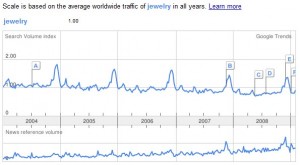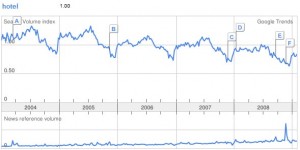One subtle aspect of pay per click optimization you have to get right (if you want your changes to have positive effects) is date ranges.
Boy is that a nerdy and boring topic! But it’s critical, because using the wrong date ranges can lead to inaccurate assessments and changes that have surprisingly bad effects on your PPC results.
The date range you choose must:
- Have enough data for optimization decisions
- Take into account seasonal variations
- Take into account macro-economic trends
1. Do you have enough data to optimize?
A lot of people ask, “how often should I optimize?” to which I reply, “It’s not about time.” It’s about how much data you get and how fast.
You certainly can’t judge an ad a failure if it only has 10 clicks. That is, unless you’re certain it should be converting above 10% conversion rate (CR). Some PPC managers wait for 100 clicks in each ad and keyword before evaluating them. You can go smaller if the CR warrants it.
For example, if your average CR is 5%, you’d expect to see a conversion after 20 clicks. If you have 40 clicks and no conversions, you’re looking at less than a 2.5% CR. You might pause that ad or keyword then, if you’re being aggressive. But generally speaking, the more data you have, the more confident you can be that it’s representative enough to predict future behavior.
The main thing to ask yourself is, “based on how much data I have for this, how certain am I that the data will look the same over the next 3 months?”
And that brings us to…
2. Are there seasonal influences on the data in the date range you’re looking at?
There are a variety of seasonal influences on buying (sales) and information-seeking (leads), including:
- Holidays like Valentine’s Day that increase interest in items like tiny chalky hearts and – oh yeah – jewelry
- Holidays like Christmas that not only increase buying in some months but also temporarily decrease purchases afterwards
- Vacation trends that affect hotel and airline searches
Google trends is a great place to check out seasonal interest in the regions you’re targeting with PPC advertising.
Jewelry :

Hotels :

The solution is to have multi-year data. But your client may not have been with you for more than a year, or may not have had good analytics in place for that long. If you have a client with less than a year of good data, look at Google trends and any other industry trends to see if you might be on a seasonal downslope.
Google trends doesn’t give clearly quantified data in its Y axis, but one trick is to get out a ruler, find the slope, and figure out what percentage decrease you’re looking at in that time of year. This is imperfect, to be sure, because it’s about impressions, not CTR or CR, but it’s better than no indicator at all.
In reports to clients, it helps to point out your results trend compared to the general interest trend. If interest is down, even flat-line results are a win.
3. Are macroeconomic factors influencing your data?
The current recession can also be seen in Google Trends data and in your PPC performance.
Again, go to Google Trends or other sources like eMarketer and Forrester. Find the slope of the downturn in your industry and take that into account in your assessment of month to month performance.
4. Avoiding Pressures to Optimize With Bad Data
The perfect storm that leads to bad optimization is:
- Hyperconcerned micromanaging clients that freak out about negative changes in PPC performance over short time frames
- Seasonal or holiday-related downturns
- Economic downturns
Put all these together, and you have a client breathing down your neck possibly forcing you to make the mistake of desperate ill-advised changes just for the sake of change.
Here’s where one of my favorite John Wooden quotes is golden: “Never mistake activity for achievement.”
Many times, the best thing to do in PPC is to wait for more data. Don’t use that as an excuse not to do what you know are best practices is PPC, but don’t be forced into ‘optimizations’ based on bad or insufficient data, lest they turn out to be ‘de-optimizations’ or perhaps ‘worsenizations’.


